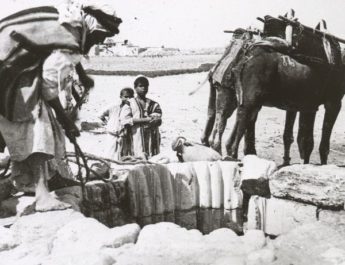Mark 13:24-37
Advent B1
24 “But in those days, after that suffering,A
the sunB will be darkened,C
and the moonD will not give its light,E
A “suffering” = thlipsis. From thlibo (to press in on and make narrow, rub together, constrict; figuratively to oppress or afflict). This is pressure that hems us in – used often of internal pressure that makes us feel like we have no other options and are confined or restricted. So, this is persecution, affliction, trouble, distress, and anguish. There is a different word, stenoxoria, that refers to external pressure that we feel from what’s going on.
B “sun” = helios. This is sun, which would imply light in general or the east.
C “darkened” = skotizo. 5x in NT. From skotos (darkness literal or figurative – as moral or spiritual darkness, sin and what comes from it; obscurity); from skia (shadow, thick darkness, outline; figurative for a spiritual situation that is good or bad). This is to darken or obscure in a literal or figurative sense.
D “moon” = selene. 9x in NT. From selas (bright flame). This is moon as bright.
E “light” = pheggos. 2x in NT– both in passages about the coming of the Son of Man (Mt 24:29 & Mk 13:24). May be related to phos (light, source of light, radiance, daylight, firelight; focuses on what the light brings to light – what it reveals). This is light, brightness, splendor, radiance, brilliancy.
25 and the starsF will be falling from heaven,G
and the powersH in the heavens will be shaken.I
F “stars” = aster. Perhaps from stronnumi (to spread, furnish, strew). This is a star in a literal or figurative sense.
G “heaven” = ouranos. May be related to oros (mountain, hill) with the notion of height. This is the air, the sky, the atmosphere, and heaven. It is the sky that is visible and the spiritual heaven where God dwells. Heaven implies happiness, power, and eternity.
H “powers” = dunamis. From dunamai (to be able, have power or ability). This is might, strength, physical power, efficacy, energy, and miraculous power. It is force literally or figuratively – the power of a miracle or the miracle itself.
I “shaken” = saleuo. 15x in NT. From salos (tossing, agitation, rolling – like the sea swells). This is to agitate or shake up. It can mean to disturb, topple, incite, or destroy.
26 Then they will seeJ ‘the Son of ManK coming in clouds’L with great power and glory.M
J “see” = horao. To see, perceive, attend to, look upon, experience. Properly, to stare at and so implying clear discernment. This, by extension, would indicate attending to what was seen and learned. This is to see, often with a metaphorical sense. Can include inward spiritual seeing.
K “Man” = anthropos. Probably from aner (man, male, husband) + ops (eye, face). This is human, humankind. Used for all genders.
L “clouds” = nephele. From nephos (cloud; figurative for a great crowd or multitude). This is cloud or cloudiness.
M “glory” = doxa. From dokeo (to have an opinion, seem, appear, suppose; a personal judgment; to think); from dokos (opinion). This is literally something that evokes a good opinion – something that connects to our understanding of intrinsic worth. The ultimate expression of this is, of course, God and God’s manifestation. So, this is opinion, honor, and dignity, but also praise, glory, renown, and worship.
27 Then he will send outN the angels,O and gatherP his electQ from the four winds,R from the ends of the earth to the ends of heaven.
N “send out” = apostello. From apo (from, away from) + stello (to send, set, arrange, prepare, gather up); {probably from histemi (to make to stand, stand, place, set up, establish, appoint, stand firm, be steadfast)}. This is to send forth, send away, dismiss, send as a messenger. It implies one that is sent for a particular mission or purpose rather than a quick errand. This is where “apostle” comes from.
O “angels” = aggelos. Probably from ago (to lead, bring, carry, guide) + agele (flock, herd, drove); {also from ago (see above)}. This is angel or messenger. Properly, it is one sent with news or to perform a specific task. This messenger can be human or an angel from heaven. More commonly, it is used for angels in the New Testament.
P “gather” = episunago. Related to “angels” in v27. 8x in NT From epi (on, upon, what is fitting) + sunago (to lead together and so to assemble, bring together, welcome with hospitality, or entertain); {from sun (with, together with) + ago (see note O above)}. This is to gather together, group together, assemble.
Q “elect” = eklektos. From eklego (to choose, select, elect); {from ek (from, from out of) + lego (to speak, tell, mention)}. This is to select or choose. It is making a person choice – a favorite.
R “winds” = anemos. From aer (air that we breathe); from aemi (to breathe or blow). This is wind or a gust of air. It can also be used figuratively for empty doctrines.
28 “From the fig tree learnS its lesson:T as soon as its branchU becomesV tenderW
S “learn” = manthano. This is to learn, ascertain, understand. It is knowledge that one gets from personal experience and it implies reflecting on that experience. It can also focus on gaining knowledge by learning facts. This root is where the Greek word for disciple comes from (mathetes).
T “lesson” = parabole. From paraballo (literally to throw beside, compare, arrive, liken); {from para (by, beside, in the presence of) + ballo (to throw, cast, place, put, drop)}. This is a parable, comparison, adage. Quite often a tale told or a metaphor to establish a point, but it could be a true story.
U “branch” = klados. 11x in NT. From klao (to break in pieces as one breaks bread). This is a branch, twig, or bough. It can also refer to descendants.
V “becomes” = ginomai. This is to come into being, to happen, become, be born. It can be to emerge from one state or condition to another or is coming into being with the sense of movement or growth.
W “tender” = hapalos. 2x in NT. This is tender or soft.
and puts forthX its leaves,Y you knowZ that summerAA is near. 29 So also, when you see these things taking place,BB you know that he is near, at the very gates.CC
X “puts forth” = ekphuo. 2x in NT. From ek (from, from out of) + phuo (to produce, spring up, grow, germinate; perhaps originally meaning puff or blow). This is to sprout up or put forth.
Y “leaves” = phullon. Perhaps related to “puts forth” in v28. 6x in NT. Perhaps from the same as phule (clan, tribe, lineage); {from phuo (see note X above). This is a sprout or a leaf.
Z “know” = ginosko. This is to know, recognize, realize, perceive, learn. It is knowledge gained through personal experience.
AA “summer” = theros. 3x in NT. From thero (to heat). This is properly heat so it refers to the summer.
BB “taking place” = ginomai. Same as “becomes” in v28. See note V above.
CC “gates” = thura. This is opening or closure so it’s a door, gate, or entrance. Figuratively, this can refer to an opportunity.
30 TrulyDD I tellEE you, this generationFF will not pass awayGG until all these things have taken place. 31 Heaven and earth will pass away, but my wordsHH will not pass away.
DD “truly” = amen. From Hebrew amen (verily, truly, amen, truth, so be it, faithfulness); from aman (to believe, endure, fulfill, confirm, support, be faithful, put one’s trust in, be steadfast. Figuratively, this is to be firm, steadfast, or faithful, trusting, believing, being permanent, morally solid). This word is literally firmness, but figuratively fidelity, faithfulness, honesty, responsibility, trust, truth, steadfastness. Properly, it is to be sure, certain, or firm. This is a word of emphasis indicating that something crucial follows.
EE “tell” = lego. Related to “elect” in v27. See note Q above.
FF “generation” = genea. Related to “becomes” in v28. From genos (family, offspring, kin – in a literal or figurative sense); from ginomai (see note V above). This is family, generation, kind, or nation. As generation, it implies an age as a period of time. It can also mean infinity. This is the root of the word “generation.
GG “pass away” = parerchomai. From para (from beside, by) + erchomai (to come, go). This is pass by, neglect, disregard. Figuratively, it can mean to perish or to become void.
HH “words” = logos. Related to “elect” in v27 & “tell” in v30. From lego (see note Q above). This is word, statement, speech, analogy. It is a word that carries an idea or expresses a thought, a saying. It could refer to a person with a message or reasoning laid out in words. By implication, this could be a topic, line of reasoning, or a motive. It can be used for a divine utterance or as Word – Christ.
32 “But about that day or hourII no one knows,JJ neither the angels in heaven, nor the Son, but only the Father. 33 Beware,KK keep alert;LL for you do not know when the timeMM will come.
II “hour” = hora. This is a set time or period, an hour, instant, or season. This is where the word “hour” comes from.
JJ “knows” = eido. This is to know, consider perceive, appreciate, behold, or remember. It means seeing with one’s eyes, but also figuratively, it means perceiving – seeing that becomes understanding. So, by implication, this means knowing or being aware.
KK “beware” = blepo. This is literally to see – it is primarily used in the physical sense. However, figuratively it can be seeing, which includes attention and so to watchfulness, being observant, perceiving, and acting on the visual information. It can also mean beware.
LL “keep alert” = agrupneo. Perhaps related to “angels” and “gather” in v27. From agreuo (to catch, capture, hunt; to trap literal or figurative); {from agra (hinting, a cach; can be specifically a catch of fish); probably akin to agros (a field as a place where one grows crops or pastures cattle; a farm or lands) or from ago (see note O above)} + hupnos (sleep literal or figurative); {perhaps related to hupo (by, under, about, subordinate to)} OR from a (not, without) + hupnos (see above). This is not sleeping, alert, watchful, vigilant, awake.
MM “time” = kairos. This is season, opportunity, occasion. The word chronos is used for chronological time. Kairos is used for spiritually significant time – the right time or appointed time.
34 It is like a man going on a journey,NN when he leavesOO homePP and puts his slavesQQ in charge,RR
NN “going on a journey” = apodemos. 1x in NT. From apo (from, away from) + demos (district, multitude, rabble, assembly; Greeks bound by similar laws or customs); {from deo (to tie, bind, compel, declare unlawful)}. This is to go abroad, sojourn in a foreign country.
OO “leaves” = aphiemi. From apo (from, away from) + hiemi (to send). This is send away, release, permit, forgive, allow to depart, discharge, or send forth.
PP “home” = oikia. From oikos (house – the building, the household, the family, descendants; the temple). This is a house, household, goods, property, family, or means.
QQ “slaves” = doulos. Related to “going on a journey” in v34. Perhaps from deo (see note NN above). This is used for a servant or for a slave, enslaved. It refers to someone who belongs to someone else. But, it could be voluntary (choosing to be enslaved to pay off debt) or involuntary (captured in war and enslaved). It is used as a metaphor for serving Christ. Slavery was not inherited (i.e. the children of slaves were not assumed to be slaves) and slaves could buy their way to freedom. Slavery was generally on a contractual basis (that is for the duration of how long it took you to pay your debt and/or save up enough money to buy your freedom).
RR “charge” = exousia. From exesti (to be permitted or lawful); {from ek (out, out of) + eimi (to be, exist)}. This is power to act or weight. It especially denotes moral authority or influence. It can mean domain, liberty, freedom, capacity, mastery, right, force, or strength.
each with his work,SS and commandsTT the doorkeeperUU to be on the watch.VV
SS “work” = ergon. From ergo (to work, accomplish, do). This is work, task, deed, labor, effort.
TT “commands” = entellomai. 15x in NT. From en (in, on, at, by, with) + tellomai (to accomplish); {related to telos (end, event, purpose, consummation)}. This is to charge or command – focuses on the final objective. So, this is looking at the final outcome of the command – how things will end up.
UU “doorkeeper” = thuroros. Related to “gates” in v29. 4x in NT. From thura (see note CC above) + ouros (guardian, watcher). This is doorkeeper or porter.
VV “be on the watch” = gregoreo. From egeiro (to awake, raise up or lift up; to get up from sitting or lying down, to get up from sleeping, to rise from a disease or from death; figuratively, rising from inactivity or from ruins). This is to be or stay awake, watch. Figuratively, it can be alertness or vigilance.
35 Therefore, keep awakeWW—for you do not know when the masterXX of the house will come, in the evening, or at midnight, or at cockcrow, or at dawn,YY 36 or else he may findZZ you asleepAAA when he comes suddenly.BBB 37 And what I say to you I say to all: Keep awake.”
WW “keep awake” = gregoreo. Same as “be on the watch” in v34. See note VV above.
XX “master” = kurios. From kuros (authority, supremacy). This is a respectful address meaning master or sir. It refers to one who has control or power greater than one’s own. So, it was also applied to God and Jesus as Master or Lord.
YY “dawn” = proi. 12x in NT. From pro (before, earlier than, ahead, prior). This is early, at dawn, during the daybreak watch.
ZZ “find” = heurisko. This is to find, learn, or obtain. It is to discover something, which generally implies a period of searching for it. This is to find in a literal or figurative sense. This is where the word “heuristic” comes from.
AAA “asleep” = katheudo. From kata (down, against, throughout, among) + heudo (to sleep). This is to settle down to rest, to sleep, fall asleep in a literal or figurative sense.
BBB “suddenly” = exaiphnes. Perhaps related to “light” in v24. 5x in NT – same as “suddenly there was with the angel” in Luke 2:13 & “suddenly a light rom heaven” in Saul’s conversion in Acts 9:3 and Acts 22:6. From ek (from, from out of) + the same as aiphnidios (literally not apparent so sudden or unexpected); {from aiphnes (suddenly); {from a (not, without) + phaino (to bring light, cause to appear, shine, become visible or clear); from phos (see note E above)}}. This is suddenly or unexpectedly.
Image credit: “Solar Eclipse from Mount Santa Lucia” by Carleton E. Watkins, 1889.




